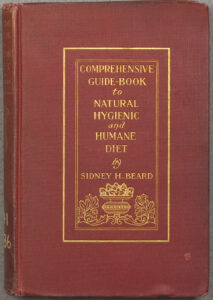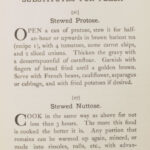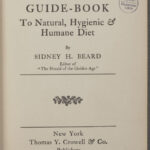“The sign of the times point most distinctly to a rapidly approaching era in which Man will return to his original food, and by so doing enter into a much happier and more peaceful state of existence upon this planet.” — Stephen H. Beard
It’s hard to believe that this idealistic plea for vegetarianism was written in Britain in 1902 rather than, say, California in the 1970s, but it’s true. At the turn of the 20th century, Britain was in the midst of a food reform movement. Vegetarianism, once the domain of fringe religious and political groups, had made some serious inroads into mainstream culture. For example, the Vegetarian Society, established in 1847 for the promotion of vegetarian acceptance and understanding, by 1900 could claim over five thousand members. Even a few Masonic lodges had resolved to be entirely “flesh-free.”
 Sidney Hartnoll Beard was a leading proponent of the movement and a popular lecturer at universities and community halls. He was acutely aware of the growing acceptance of vegetarianism, and saw an opportunity for greater exposure. Though his early writings had included a host of incendiary titles — Ten Reasons Why the Use of Flesh-Food should be Abandoned by All Humane, Cultured, Philanthropic and Religious Persons, and Is Flesh-Eating Morally Defensible? among them — he chose a much gentler title for this, his first book to be published in both Britain and the U.S.
Sidney Hartnoll Beard was a leading proponent of the movement and a popular lecturer at universities and community halls. He was acutely aware of the growing acceptance of vegetarianism, and saw an opportunity for greater exposure. Though his early writings had included a host of incendiary titles — Ten Reasons Why the Use of Flesh-Food should be Abandoned by All Humane, Cultured, Philanthropic and Religious Persons, and Is Flesh-Eating Morally Defensible? among them — he chose a much gentler title for this, his first book to be published in both Britain and the U.S.
A cursory glance through A Comprehensive Guide-Book yields plenty of strange or obsolete foods (nuttose, protose, plasmon) along with bizarre, long-abandoned health advice (eating fruits and vegetables at the same meal is a “hygienic blunder”). Further inspection, however, reveals Beard’s book to be an earnest plea for conscientious health that seems remarkably prescient, given today’s local/organic/natural food movement. He recommends certain fruit juices for their anti-oxidant properties; he encourages an Eastern-inspired notion of moderation; and, perhaps most perceptively, he recommends simple methods of cooking that bring out food’s natural flavor rather than hiding it with the endless cascades of bland,  unhealthy gravy so common to British and American diets at the time.
unhealthy gravy so common to British and American diets at the time.
Considered a seminal classic today, the book received mixed reviews at the time of its publication. Publishers’ Weekly praised its abundance of “toothsome dishes” that will appeal to “every house-keeper, irrespective of her food-creed.” New England Magazine, however, was skeptical of recipes “copiously interlarded with preachments intended ‘to stimulate the growth of the higher self.’” Still, the magazine did praise Beard, if only cynically, for his respectable, though ultimately futile effort to convert “human carnivora” to vegetarianism.




